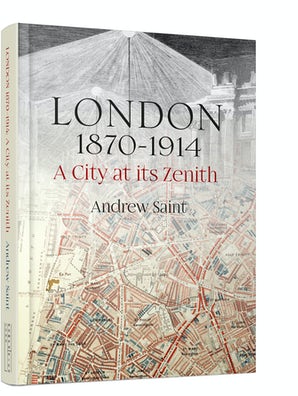Book of the Month June 2023: London 1870-1914
London Festival of Architecture – a month long celebration of architecture & city-making – is taking place across London throughout June. So, we thought it appropriate to make London 1870-1914 our June Book of the Month, celebrated with 20% off when you apply code MONTH20 at checkout.
LONDON 1870-1914: A CITY AT ITS ZENITH by Andrew Saint is beautifully illustrated with a range of cartoons, newspaper articles, maps, paintings and portraits, as well as architectural photographs and drawings. It is a delightful, intelligent revelation of Victorian and Edwardian London.
This book conveys the excitement, diversity and richness of London at a time when the city was arguably at the height of its power, uniqueness and attraction. Balancing the social, the topographical and the visible aspects of the great city, author Andrew Saint uses buildings, architecture, literature and art as a way into understanding social and historical phenomena.
While many volumes on Victorian London focus on poverty (an issue which is included in this book), the author here provides a broader picture of life in the city. It is enlivened with a rich line-up of colourful characters, including Baron Albert Grant; Henry Mayers Hyndman and his connections with Karl Marx, William Morris and George Bernard Shaw; John Burns; Octavia Hill; Aubrey Beardsley and the artistic bohemians; Alfred Harmsworth and the Garrett sisters, and includes insightful quotes on London by esteemed authors such as Trollope, Henry James and Rudyard Kipling.
Divided into four long chapters, each dealing with a decade, London’s evolution between 1870 and 1914 comes across clearly. Although not intended to be a complete history, it does cover all the most important historical developments in London and London life. Particular issues are allotted to the decade in which they seem to have been most critical. Topics covered include: the creation of new neighbourhoods and roads; how the Victorians dealt with their housing crisis; why certain architectural styles were preferred; and the fashion for focusing on certain types of building, such as ice rinks, schools, houses, hospitals, fire stations, exhibition halls, water works, music halls, recital rooms and pubs.
This is an up-to-date, readable and well-illustrated book which embraces the whole in a positive spirit. Saint’s interpretation of London’s history in the period covered is unashamedly one of progress in the face of great odds. He shows that, in almost every aspect, it was a much better city in1914 than in 1870. At a time when local autonomy in Britain has been ruthlessly downgraded and London’s face is every year coarsened further by money-led developments, this story of gradual and earnest improvement may have lessons to teach.
ORDER YOUR COPY WITH 20% OFF HERE


